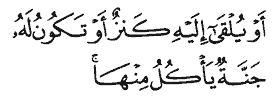Living The Quran
From Issue: 638 [Read full issue]
Working for Living
Al Furqan (The Criterion) - Chapter 25: Verse 8 (partial)
 "Or why has not a treasure been granted to him? Or he should have a garden to provide his sustenance."
"Or why has not a treasure been granted to him? Or he should have a garden to provide his sustenance."
An absurd objection focused on God's Messenger, peace be upon him, walking about the market-place earning his living: his position as Messenger would have been recognized had he been granted great wealth to save him the trouble of so working for his living.
But God willed that His Messenger should not have treasure or garden, because He wanted him to be a perfect example to be followed by his community. He was to fulfil the great task of delivering his message while he worked, earning a living at the same time. Thus, none of his followers could argue that the Prophet was freed from the responsibility of work, and thus was able to devote all his time to his message. None would take this as an excuse for not fulfilling his duty towards the divine message. We see clearly that the Prophet worked for his living while he also worked for his message. It is right, then that every one of his followers should do the same, so as to fulfil his own task towards the divine faith.
Wealth was later given in abundance to the Prophet so as the first experience should be completed and the example he provided be perfected. He did not allow such wealth to become his preoccupation, preventing him from the fulfilment of his task. Indeed, his generosity was so superior that is was likened by his Companions to unrestrained wind. He provided a perfect example in resisting the lure of wealth so as to enable his followers to look at affluence in the proper perspective. Thus, no one could say that Muhammad was able to fulfil the duties of his message because he was poor, having no preoccupations of wealth, free from the task of looking after it. Instead, he fulfilled his duties in both situations of poverty and affluence.
Compiled From:
"In The Shade of The Quran" - Sayyid Qutb, Vol. 12, p. 388